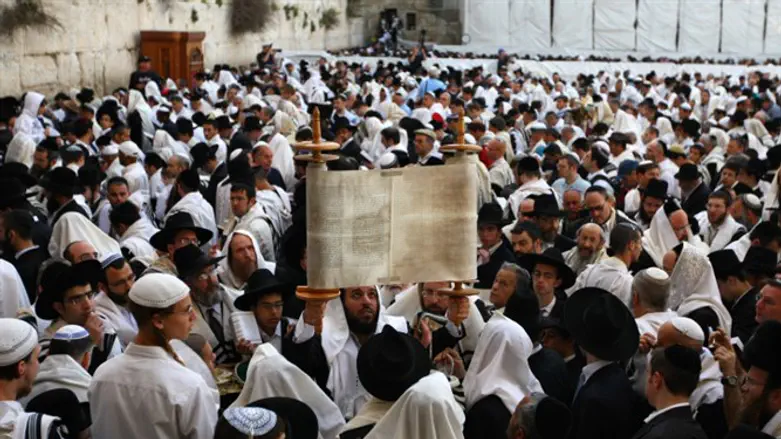
Following his wrestling match with the stranger (Bereishiet 32), Yaakov returned home enjoying a sense of victory, “intact physically, emotionally, and with his wealth” (as Rashi comments). Yet a heavy cloud darkened his joy, for his brother Esau was waiting for him with 400 men.
The unavoidable encounter would not just be between two quarreling brothers, but would be a conflict between two worldviews destined to influence the entire course of history. Yaakov prepared a gift for Esau, prayed and, as a last recourse, readied for war. He also divided his family and property into two camps so that should Esau smite one, the other could escape.
Dividing the family into two camps was an appropriate step. So, it is puzzling that at the last moment, prior to the encounter, Yaakov reunited the two camps. (The Torah even informs us how the family was arranged: Bilhah and Zilpah and their children were in the first row, behind them were Leah and her children, and last came Rachel and Yosef.) Why had Yaakov changed his mind? Wasn’t he still anxious and troubled?
The answer is concealed in that mysterious struggle that occurred the night before the encounter with Esau. The Torah states (Bereishiet 32:25), “Yaakov remained alone. A man appeared and wrestled with him.” But if Yaakov “remained alone,” does that not imply that there was no “man” present?
I suggest:
Yaakov did in fact remain alone. The “man” who wrestled with him was none other than the inner spirit of Yaakov himself. Yaakov was still very afraid of his brother, yet had Hashem not promised to return him safely to his father’s house?
So Yaakov was emotionally torn. If he believed in Hashem, then why should he be afraid? And if he was afraid nonetheless, does it mean that his faith in Hashem was tainted? Because of these uncertainties, Yaakov was alarmed that he, too, might be tainted with his twin brother’s wickedness and heresy. All that night, Yaakov struggled with himself to clarify who he really was.
By dawn, Yaakov had rid himself of all doubts and resolved that he was Yaakov, son of Yitzchak and Rivka, grandson of Avraham and Sarah, and that he had nothing at all in common with his brother Esau. “I am a believing Jew,” he decided. No more fear, no more compromise, no more divided camps. There would just be faith in Hashem’s promise to protect him in desperate situations.
Yaakov returned and united the two camps and, with a brave heart, let the whole family know that they must not worry because Hashem was with them.
Yaakov stood tall as Esav drew near with his 400 men. But, at this fateful moment, Yaakov did another about-face. Suddenly, he prostrated himself in absolute surrender with his face to the ground. He and his family bowed seven times before Esav.
Previously, Yaakov had been told that his name would be changed to Israel, because he had triumphed in the harshest struggle of his life. At this encounter with his brother, Israel reverted back to Yaakov – the same Yaakov who, during birth, had grabbed onto Esav’s heels. These evil heels were destined to trample on Yaakov’s future generations until such time that the Jewish people will rise up and proclaim that, despite all, they believe totally in Hashem.
We, Yaakov’s sons and daughters, survived the darkness of the exile, in which our status as the Chosen People was put to the test countless times. In the new dawn of Jewish history, Hashem opened up the gates of the land so we could recover from the wounds caused by Esau’s descendants.
We succeeded within a few years in establishing one of the smartest and strongest armies in the world. We number almost seven million Jews in the Land of Israel and can count unfathomable victories over all of our enemies, achieved with the blessings of Hashem.
Our lives reflect the advanced stages of the coming Final Redemption. Yaakov’s true, authentic descendants know that following Hashem’s path means advancing proudly towards victory.
On Mount Zion will be deliverance
Yaakov understood and relayed the message to his children that their future survival in galut would force them to bow before Esau’s savage offspring, until the time when Hashem will give the order “NEVER AGAIN”.
This occurred on the fifth of Iyar 5708-1948 C.E., when the God of Yisrael spoke through the mouth of David ben Gurion and announced the establishment of a Jewish State in Eretz Yisrael “to be called Medinat Yisrael”.
The establishment of the State was not intended to dispose or even diminish Esau’s hatred towards Yaakov, just the opposite, European Esauism viewed Yaakov’s return to Eretz Yisrael in 1948 as a personal challenge; and they are to this day covertly, stealthy, furtively, surreptitious planning the elimination of the Jewish state.
However, the prophetic words of Ovadia precede all their intentions and attempts:
17 But on Mount Zion will be deliverance; it will be holy, and Jacob will possess his inheritance.
18 Jacob will be a fire and Joseph a flame; Esau will be stubble, and they will set him on fire and destroy him.
There will be no survivors from Esau.”
The Lord has spoken.
Excerpt from the writer's forthcoming book “Reflections from Yerushalayim”
Rabbi Nachman Kahana is an Orthodox Rabbinic Scholar, Rav of Chazon Yechezkel Synagogue – Young Israel of the Old City of Jerusalem, Founder and Director of the Center for Kohanim, and Author of the 15-volume “Mei Menuchot” series on Tosefot, and 3-volume “With All Your Might: The Torah of Eretz Yisrael in the Weekly Parashah”, as well as weekly parasha commentary available where he blogs at http://NachmanKahana.com
